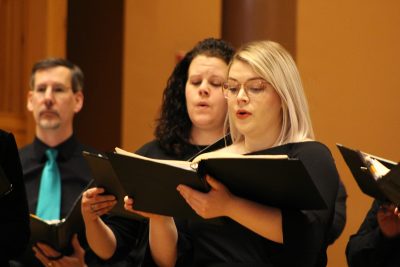“Nevertheless, she persisted” has become a frequently-used phrase for modern female empowerment movements after Massachusetts Sen. Elizabeth Warren’s testimony during Jeff Sessions’s Attorney General nomination hearings. Now, it is the title of a concert with the same goals in mind.

The Seraphim Singers performed at the First Church in Cambridge on Sunday with a concert entitled “Nevertheless, She Persisted.” This was the second day of a two-day set at the church.
The Seraphim Singers, formed in 1997, are a religious choral group grounded in modern-day social relevance, singing songs that blend secular themes with Christian texts, according to the group’s website.
Jennifer Lester, the music director and founder of the Seraphim Singers, said in an interview that she founded the group with her friends in response to music groups being dominated by male conductors and music directors.
“We were all church musicians. Organists, choir directors in churches, and we sang together for … a project in grad school,” Lester said. “It was, ‘Throw together a choir and find a piece that nobody’s done before, and do it.’”
Shruthi Rajasekar’s “Nevertheless” was performed in its world debut at the concert. The song is lyrically composed of excerpts from a Feb. 7, 2017 United States Congressional hearing, according to the program, and featured Senator Mitch McConnell’s statements regarding Warren’s testimony toward Sessions.
Rajasekar crafted the song after the decision to entitle the program “Nevertheless, She Persisted,” Lester said, and decided to look back to where the phrase originated.
The program encompassed 11 songs that were almost solely arranged by women, with the exception of “Woman of No Distinction,” which was composed by Richard Clark. The setlist was a combination of religious works and secular songs focused on feminist issues and piano pieces.
While its origins were based in a predominantly religious context, Lester said the ensemble has evolved into embracing the plights of modern day societal problems and incorporating those themes into what they sing.
“From [Christian] tradition over the years we’ve certainly broadened out, and religion isn’t something that’s separate from politics,” Lester said. “People see the world through whatever their faith or non-faith happens to be.”
The two piano interludes in the set — “Lenten” and “Whit” — were played with elegance by Louise Mundinger, each chord echoing off the church walls as the walls adjusted with each crescendo and decrescendo.
“Border Lines” provided an instrumental solo, with Paul Mattal playing a masterful cello, and was a high point of the concert. The lyrics called for an erasure for borders: both physical and emotional, a sort of call to arms. “Because what is a map but / a useless prison?” the choir sang with conviction and certainty that turned the lyric from a question into a statement.
As the concert was performed, a fire siren was heard from outside the church. Unrelated to the performance, the dissonant emergency sound reflected the intensity of the performance was a fitting juxtaposition.
“Woman of No Distinction” was sung with haunting conviction by soloist Julia Sullivan, the choir’s background harmonies adding a subtle but needed dynamic to ground her stunning soprano voice. With the song’s lyrics presenting the insecurities of women in a society that only values a woman’s appearance, Sullivan displayed an emotional prowess necessary for those lyrics to remain powerful instead of overwrought.
“There Is No Age,” the final song of the program, ended the program with an uplifting note about opening oneself up to others, once again sung in a round. This style choice added an interesting thematic dynamic of differences uniting people together, fully fleshing out the theme of equality and kinship that permeated throughout the entire performance.
At the completion of the concert, the crowd gave a standing ovation to the Singers and Rajasekar, who was in the audience and brought on stage after the choir finished singing the song.
“Nevertheless, She Persisted” serves as a follow up to “Women’s Perspective,” an event put on by the Seraphim Singers last year, Lester said. In previous years, the group has drawn inspiration for concerts from a variety of topics, ranging from silent film-era scores, the fall-out from World War I, John F. Kennedy’s assassination and the lead-up to the 2016 presidential election.
The concert was performed with a strong sense of technical singing ability while still remaining grounded in reality instead of getting lost in the vocal gymnastics of many church choral groups. Both religious and secular attendees alike could feel the raw emotion coming from the choir’s beautiful singing.



















































































































